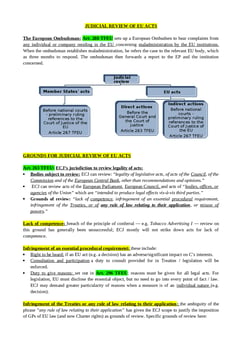- Law Cases
- European Law Cases
- The sources of ec law and its supremacy over national law in the event of conflict Cases
Case C-303/05 Advocaten voor de wereld [2007] ECR I-3633
Judgement for the case Case C-303/05 Advocaten voor de wereld
Table Of Contents
-
Belgian court referred two questions to ECJ:
Is the Framework Decision compatible with Article 34(2)(b) EU, under which framework decisions may be adopted only for the purpose of approximation of the laws and regulations of the member states?
Is Article 2(2) of the Framework Decision, insofar as it sets aside verification of the requirement of double criminality (traditionally extradition requires that the defendant has committed a crime in both the requesting and executing states) for the offences listed therein, compatible with Article 6(2) EU (protection of fundamental and ECHR rights) and, more specifically, with the principle of legality in criminal proceedings (Plaintiff argued that the failure to define the offences listed by the framework decision to which the warrant would apply) guaranteed by that provision and with the principle of equality and non-discrimination (since it is pot luck whether the ‘issuing/requesting’ state defines one of the crimes subject to the arrest warrant in a particular way/prescribes a particular penalty)?
ECJ
-
ON QUESTION 1
ECJ held that the mutual recognition of arrest warrants IS to do with approximation of laws and regulations, e.g. rules of conditions, procedures and effects of surrender.
-
ON QUESTION 2
-
ECJ held that the framework did not infringe this principle as it does not seek to harmonise the criminal offences in question. Instead, the definitions of the offences and penalties in question continue to be matters determined by the law of the issuing member state.
It is therefore up to the criminal laws of the member states to respect the principle of legality.
It didn’t say whether the arrest warrant infringed principle of non-discrimination, but said that in any event it was objectively justifiable.
NB AG Colomer said the court must recognize the authority of the Charter of Fundamental Rights as an interpretative tool at the forefront of the protection of the fundamental rights which are part of the heritage of the Member States.
-
Geyer in Case note in Cambridge Law Journal
Decision established that extradition is a procedure rather than criminal offence itself (conclusion inferred from courts refusal to apply legality principle to Article 2(2) of the decision, saying that it was not seeking to harmonise criminal offenses, leaving definitions and legality concerns to individual Member States).
This raises question of what might happen if extradition is opposed on grounds that offence in issuing state doesn’t comply with legality principle.
Will the EAW (European arrest warrant) be held to comply with Article 6 EU, which respects fundamental and ECHR rights, including legality.
For Further Study on Case C-303/05 Advocaten voor de wereld
Need instant answers? Our AI exam tutor is here to help.
Ask questions 🙋 Get answers 📔 It's simple 👁️👄👁️
Our AI is educated by the highest scoring students across all subjects and schools. Join hundreds of your peers today.
Get StartedSimilar Cases
Related Product Samples
These product samples contain the same concepts we cover in this case.
| European Law | General Principles And Fundamental Rights Notes (32 pages) |
| European Law | Supremacy And Fundamental Rights Notes (37 pages) |

 Since 2010, Oxbridge Notes has been a trusted education marketplace, supplying high-quality materials from top achievers at universities like Oxford, Cambridge, LSE, Harvard, and Yale.
Since 2010, Oxbridge Notes has been a trusted education marketplace, supplying high-quality materials from top achievers at universities like Oxford, Cambridge, LSE, Harvard, and Yale.